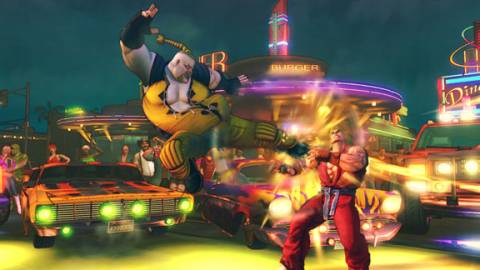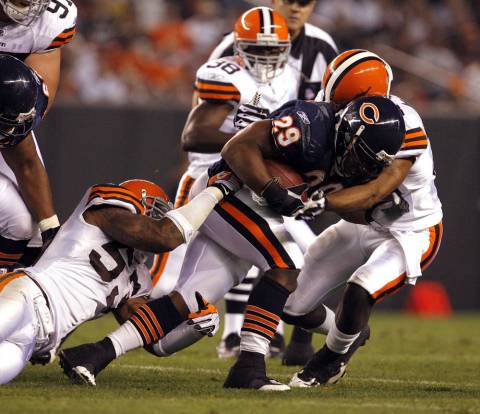
There have been some apocalyptic responses to S.978, a bill currently working its way through the U.S. Senate. The bill would make the online streaming of copyrighted content a felony.
The current version of the law only impacts peer-to-peer transfers and web downloads, with this wrinkle adding "online streaming" to the mix.
The response from gamers has been akin to the sky is falling.
Nothing in the law mentions video games. This bill is primarily intended to target music and movies, with organizations like the Motion Picture Association of America and Recording Industry Association of America giving the bill a thumbs up as it lumbers forward.
Just because there's no mention of games, however, doesn't mean games aren't (or couldn't be) affected, but to what extent? The heated rhetoric has lead to proclamations as grand the end of Giant Bomb (which isn't happening), prompting me to investigate the issue.
"The legislation is worded far too broadly and can easily apply to video games as a result," said Hal Halpin, president of the Entertainment Consumers Association, fresh off the Supreme Court victory. "Part of the problem that we have in educating the public, and gamers in particular, is that they don’t see games called out specifically and therefore feel that they’re excluded. In fact, it’s the opposite--because there is no explicit exclusion for video games in the bill, they are included."
The Entertainment Software Association, representing the industry's publishers, did not return a request for comment.
The bill is sponsored by Minnesota Democratic Senator Amy Klobuchar and co-sponsored by Delaware Democratic Senator Chris Coons and Texas Republican Senator John Cornyn.

At a Senate Judiciary Committee meeting about the bill on June 9 (you can watch the entire hearing over here), Klobuchar said the bill wasn't targeting ordinary individuals but egregious offenders. Her analogy involved a street peddler selling pirated CDs and DVDs. If their inventory's worth more than $2500, it's a felony. Someone doing the same thing through streaming is limited to a misdemeanor.
"The bill is not intended nor does it allow law enforcement to prosecute people who may stream videos and other copyrighted works to their friends without intending to profit from the work of the copyright owner," she said. "It also does not allow prosecutors to go after individuals that innocently post links on their blogs to copyrighted protected works."
"For this bill to affect someone, the person would have to be already committing a crime under current law," she continued. "This bill just makes the worst of those crimes and makes them a felony."
Klobuchar appears to be targeting individuals solely profiting off streaming content they didn't create. The key word is "profit," as Klobuchar claims some illegal streaming websites are already make $40 million per year without producing a thing.
Have you ever watched a stream of an NFL game through a decidedly shady looking website? She's talking about places like that. The scope of the bill, however, means it could be applied elsewhere.
"Is the passage of S.978 a catastrophe waiting to happen?" posed Andrew Ehmke, an attorney at Texas-based Haynes and Boone, LLP. "Catastophe is probably too strong of a word, but a lot of the commentary and concern about the scope and breadth of the law is legitimate."
Uncertainty strikes at the heart of this. It's why you see videos like the one embedded below showing up, where the consequences of this bill coming into law have suddenly become taking down half of YouTubes's video game content and largely diminishing the coverage coming out of events like E3.
Game videos are enormously popular on YouTube and other video services. Live streaming new games on launch day are incredibly common. Ehmke doesn't foresee those people having any problems.
"For it to be criminal copyright," he explained, "one of the elements is 'for purposes of commercial advantage or private financial gain.' I would hope that the FBI would not view a random YouTube user as somehow falling within the definition of 'for purposes of ... private financial gain.' However, if someone posts to YouTube with a link back to a web site, which contains banner ads that pay-per-view, that seems to move closer to 'for purposes of ... private financial gain.'"
It's hard to see anything happening on the scale of what the video suggests, but as a result of the vague wording, people speculate, with advocates like Halpin fueling the fire, suggesting that people aren't blowing this out of proportion.
"We’ve taken grief from naysayers as well," he said. "As consumer advocates, our job is not to worry about the best case scenarios, but rather the worst case ones. We ran the bill past internal and external legal experts and all agree that it’s very dangerous as presently crafted."
Some counterarguments fall back on "fair use," which allows appropriation of copyrighted content. In order to qualify for "fair use," the person must first prove the content's being used for "criticism, comment, news reporting, teaching, scholarship, or research." Proving that will be difficult for some.

"If the law passes, the real issue will be whether the FBI chooses to enforce the law in a given scenario, and in what manner," explained Ehmke. "While possible under the wording of the law, it seems unlikely that the FBI has the time, effort, or inclination to start arresting every poster to YouTube who gets 10 hits on his achievement guide video. That being said, the lack of willingness by the FBI to enforce probably does not give comfort to those who do not want the law passed at all."
If.
Right now, hearings on the law are over. Congress is scheduled for a month-long recess in August, unless a deal on the debt limit isn't reached and the session is extended. S.978 will either come up in the next two weeks or get pushed back until when Congress resumes in September.
Halpin said he's been in contact with the three legislators involved with the bill, but would not disclose the nature of the conversations.
"I can say that conversations are ongoing, for now," he said. "If and when things progress beyond that point, we’ll certainly keep [everyone] in the loop."
You can keep tabs on the bill through govtrack.us, a tool for monitoring bills as they slowly but surely move through our legislative bodies. Tools to contact each legislator are available on congress.org.